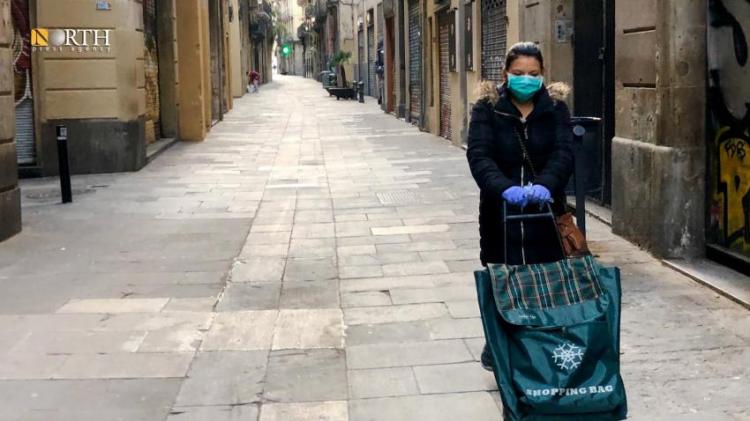North-Press Agency
Hoshang Hassan
The streets of Spain's cities, known for their music and parties, are withered in emptiness and wrapped in silence, sometimes pierced by the sound of ambulances. The crowds in public places disappeared to hide in their homes out of fear. A single question that everyone has in mind, will I be the next, or will I survive?
According to the data announced by Johns Hopkins University, on Monday, the number of infections with coronavirus in Spain was 166,831 while deaths reached 17,209, making it the first European country in terms of the number of infections due to the virus, and the second in the world after the United States of America. The number is still rising daily.
Alert
Dr. Cami Ibrahim, head of the emergency department at the Dos de Maig Hospital in Barcelona, told North-Press that the situation in Spain has been aggravated for several reasons, the most important of which was the delay in the global political response in terms of considering coronavirus as a global epidemic and governments taking the necessary measures.
"We are now in a state of mass hysteria, running in all directions without getting anywhere."
Yesterday, Sunday, the Spanish Ministry of Health data stated that the capital Madrid is still the most affected, as the number of infections has reached 46,587, followed by the Catalonia region with 34,027 infections. Catalonia, the northeastern province of Spain with its capital Barcelona, has decided to separate from Madrid for a long time, however, its first ambition today is to address the epidemic.
Late state of emergency
On the 14th of March, the state of emergency in the country was declared. Schools, universities and shops were closed, but factories and companies were still operating until the end of the same month, which subjected the government yo criticism from observers.
According to the Spanish Ministry of Health, the outbreak is catastrophic due to the infection of more than 14,000 people among doctors, nurses, and anti-virus technicians in the first line of defense, which exacerbated the situation and forced the government to use retired doctors and nurses, in addition to seeking help from medical school students.
"Stay at home"
Dr. Carmen Alegria, who was infected with the virus during her work at the "PAC" Hospital in the city of Cáceres, told North-Press: "I felt that my temperature was rising, I found it difficult to breathe and felt pain in my entire body." After subjecting herself to the necessary tests, the result was positive, so she quarantined herself inside her house until she recovered.
According to the 50-year-old physician, the virus infects the young and the old, regardless of age. "Yes, the death rate among the elderly is greater than others, but this does not mean that it does not affect young people," she said.
At the end of her talk, she advised people to stay at home until a vaccine is discovered for this "lethal enemy.”

